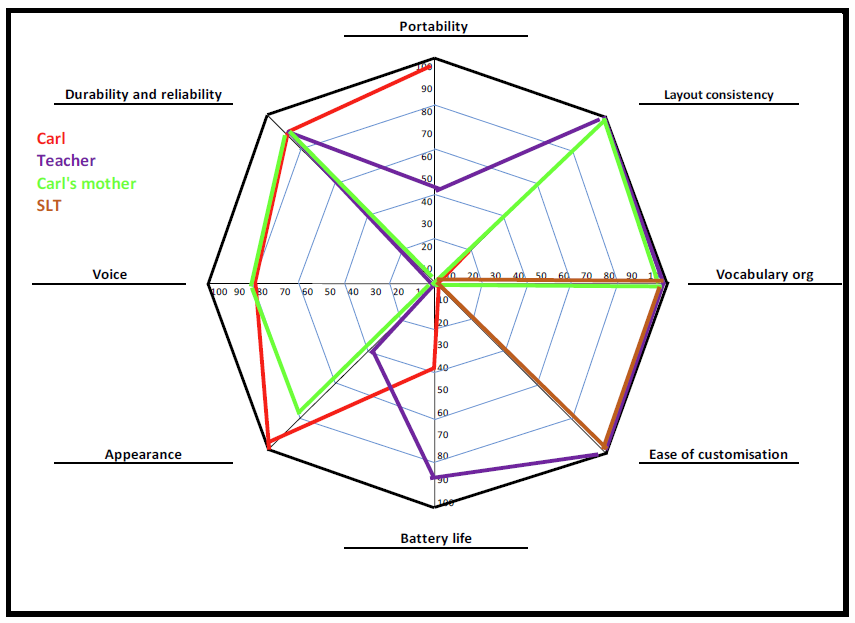 Newsletter: join thousands of other people
Newsletter: join thousands of other people
Once a month we'll send you an email with news, research and thoughts, as well as training courses and free webinars you may wish to attend.
Our websites:
Posted by Paul Nisbet on the 26th August, 2019

A few weeks ago on August 5th we launched the new Scottish Child Voices for communication aids. The response has been really positive and it's started me thinking that the range of voices available for people that use communication aids is pretty limited, and what we might do to improve matters.
The launch of the Scottish Child Voices was picked up and reported in The National and The Scotsman newspapers, and then last week on Tuesday 20th August, Lachlan Morris, one of the first young people in Scotland to get the Andrew voice, was featured on Radio Scotland (the piece starts at 1 hour 30 if you want to listen to it) so it's good to see AAC being covered in the media. Lachlan has been speaking with the adult Stuart voice since he got his device and said he was blown away with his new boy's voice.
Coincidentally, on August 7th, two days after we went live with the new voices, there was a piece called Finding My Voice on the BBC One Show featuring Lee Ridley, the Lost Voice Guy, and four AAC users. It starts about 3 minutes 30 into the programme. Apparently a few months ago Lee launched an appeal for volunteers to make recordings that would be used to create personalised voices for the students and this programme reported on the results. The four students are from Northern Ireland, Reading, Wales and the West Midlands and the voices were created by CereProc, who of course make our Scottish voices.
Lee asked the students what they felt about the more generic voices that they had been using previously and the responses were really interesting: Ted said that his voice "didn't sound anything like I want to" and that "it doesn't represent me or how I want to be heard" while Taleah said she didn't tend to use her device when she was back home because it doesn't have a Northern Irish accent.
Happily, the students were all really pleased with their new voices. Jack, who now has a Black Country accent, said that he talks more and feels more confident to approach people that he doesn't know. To celebrate having their new voices, Lee coached the four students to prepare and then deliver a comedy show, which was featured on the One Show the next evening - it's definitely worth a watch.
It seems obvious that people who use communication aids are likely to want voices that are age and culturally appropriate, but I think we who work with the technology - developers and AAC professionals - don't appreciate how important it is to have a voice that reflects your own locality and personality. There's very little research that I could find about voice choice for communication aid users. Last year I attended an event where Professor Janice Murray and the i-ASC team were reporting on their project to research factors to help decision making for symbol based communication aids, and I remember that she commented that the team had found that the features and characteristics of AAC devices that are most important to AAC users often seem to be quite different to the features that are most important to AAC professionals.
The team developed a Spidergram to help teams gather and consider these different perspectives, and there's a good example below taken from the i-ASC How to use the spidergram resource. Here, Carl and his mother both regard the voice, durability and appearance as really important in a communication aid, whereas the Speech and Language Therapist and teacher don't apparently think the voice is at all important. The SLT thinks that the vocabulary organisation is most important but that apparently doesn't matter much to Carl, the user.

The i-ASC research, Lachlan's story, and the comments from Jack, Nathan, Taleah and Ted make me think that we need to do more to get a better range of voices for people to use in their communication aids. I'm pleased that we've been able here in Scotland to licence Scottish voices for AAC users and the Scottish public sector, but I think we need more variety and more regional variation.
There are already services for creating bespoke voices, for example:
While the Speak Unique project at University of Edinburgh has been creating a bank of Scottish accent voices for eventual use in communication aids, although the research has not as yet resulted in a service for users.
There's a few ideas that immediately spring to mind:
I've been aware of these technologies for creating bespoke voices for a while but always assumed that the quality of the voices would not be good enough - because the recordings are relatively short - compared to voices like Andrew and Mairi, or Acapela's Harry and Rosie - that are created using from longer recording sessions. But maybe some AAC users would be happy to have a voice that doesn't sound quite a good if the accent reflected their own personality? The students on the One Show seem pretty sure about this.

4-week short study online course

Once a month we'll send you an email with news, research and thoughts, as well as training courses and free webinars you may wish to attend.
Our social media sites - YouTube, Twitter and Facebook